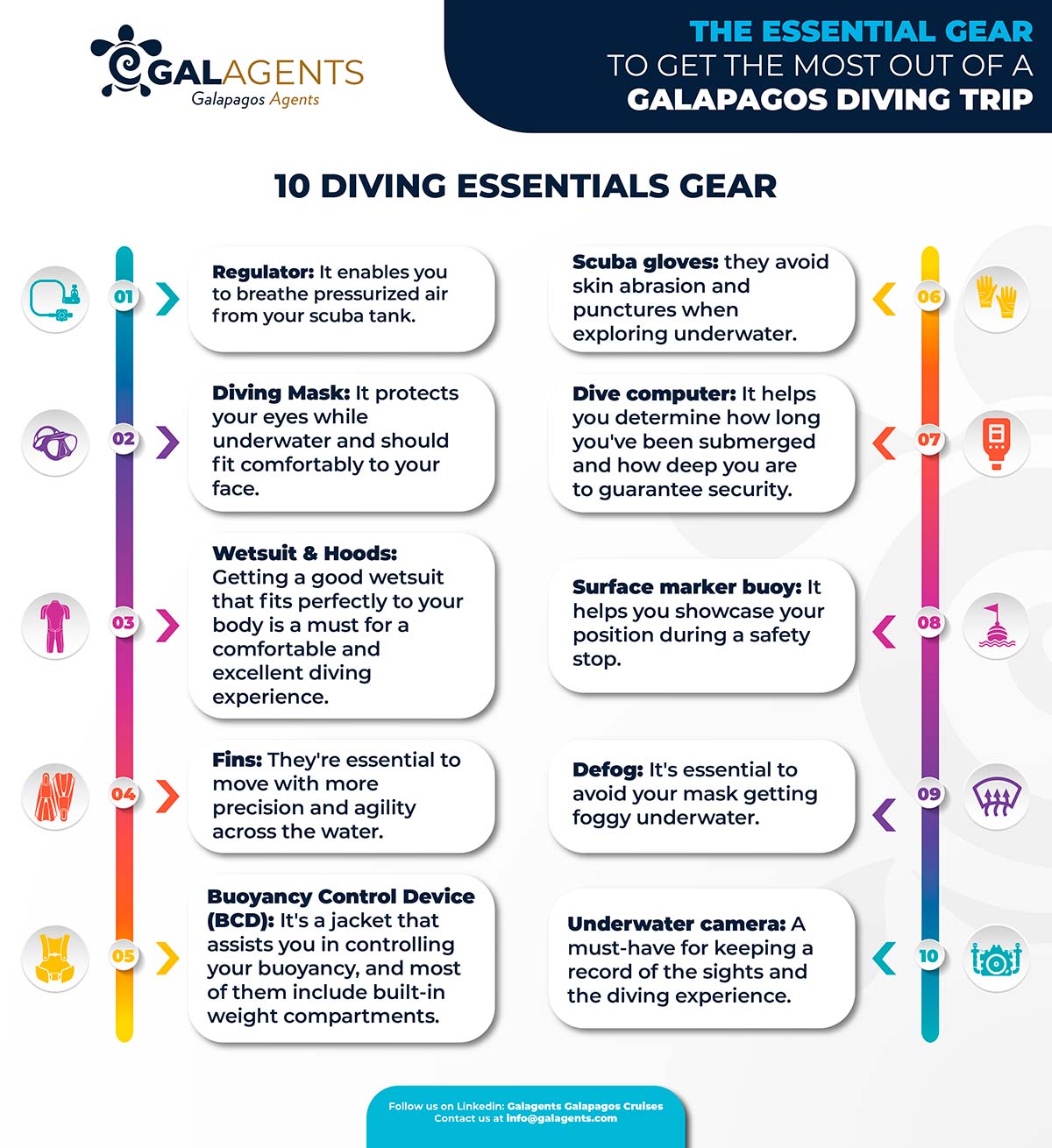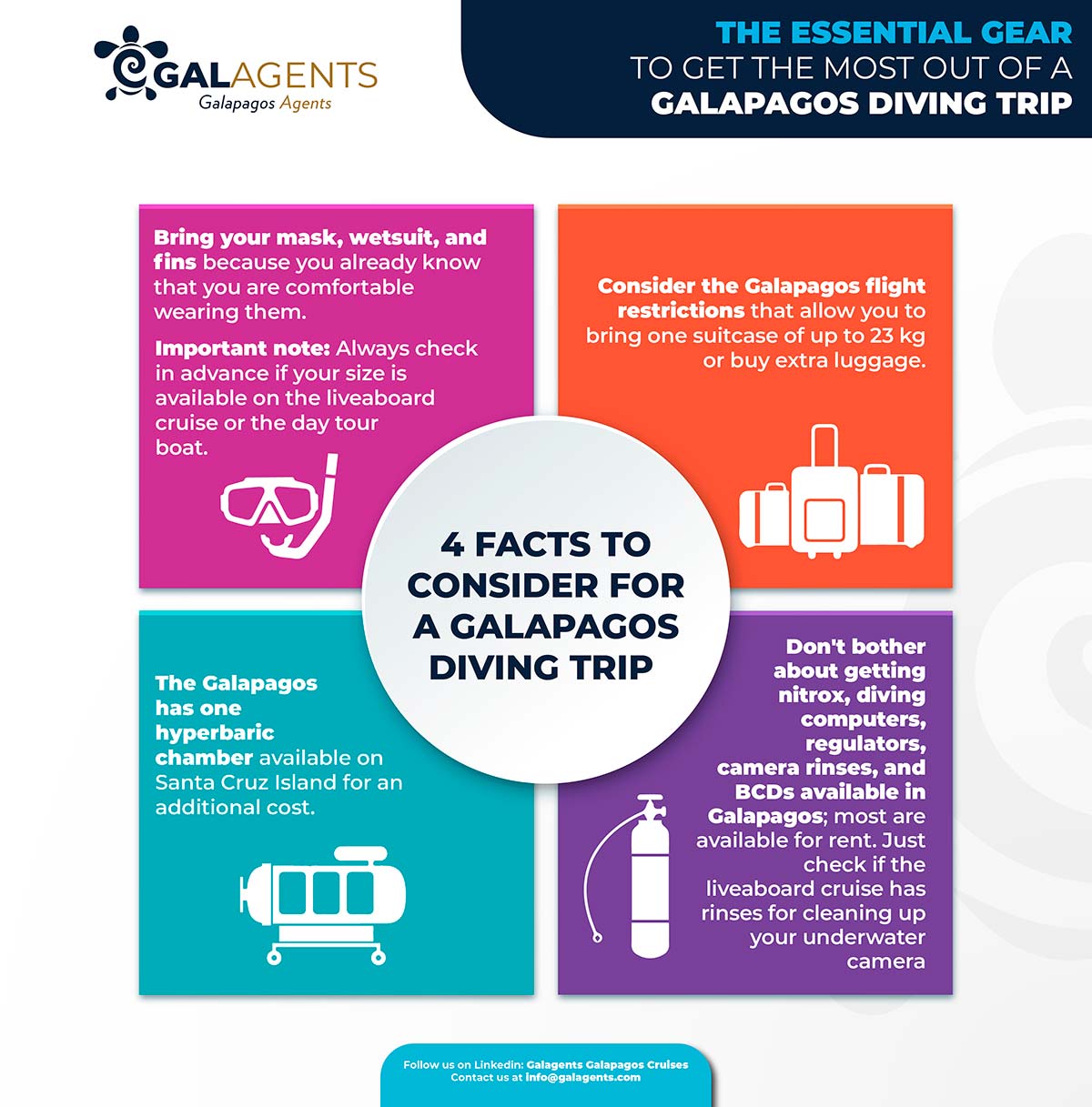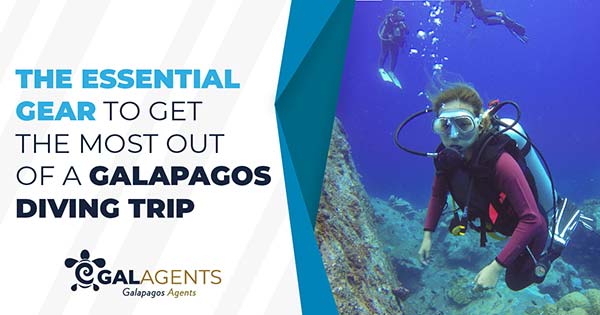As we have mentioned previously in several articles, the Galapagos Islands is a top-notch destination for worldwide divers, from beginners to advanced. No matter if the traveler wants a day tour or a liveaboard cruise to reach some of the diving sites with unique marine wildlife.
But, if you’re novel commercializing diving trips or willing to attend this important market niche, keep reading this short article that will give you valuable information for you and your clientele.
10 diving essentials gear
First of all, no matter where your scuba diving, there are essential to be comfortable during the immersion, so the following gears are a must-have for any diver:
1- Regulator
The regulator enables you to breathe pressurized air from your scuba tank. It reduces the air’s intense pressure to ambient pressure. The regulator has two stages: the first stage connects to the tank you wear on your back, and the second stage is the device you put in your mouth and must be comfortable for you to use
2- Diving Mask
The diving mask will be your eyes while you are underwater. It should fit comfortably to your face to let you see well underwater. The best way to try it is by holding the mask softly against your face and taking a few little breaths through your nose to create a slight suction. Another important fact is that those divers that need prescribed glasses can order personalized masks with ophthalmologic prescriptions.
3- Wetsuit & Hoods
The quality of a dive can be determined by how well the wetsuit fits. Moving around in the water will be challenging if your wetsuit is overly restrictive or excessively loose because it may allow water to enter, leaving you chilly and unpleasant. Also, it´s crucial to have a diving hoodie to cover the head while scuba diving. Please consider that the perfect wetsuit should have a second-skin-like fit as flexible to stretch your body out.

4- Fins
The fins help you move with more precision and agility across the water. Depending on where you’re diving, you can choose the type of fins you should wear. For instance, the entire foot fins are better in warm waters, and heel fins are for warm and cold water but need you to wear booties.
5- Buoyancy Control Device (BCD)
To assist you in controlling your buoyancy, you need a jacket that you put on when diving or BCD. It helps you establish and maintain neutral buoyancy throughout the dive and carry a tank with minimal effort.
Many BCDs include built-in weight compartments, so you don’t need a separate weight belt. BCD should fit snugly but not too tightly when inflated to not restrict your breathing.
6- Scuba gloves
Scuba diving gloves are composed of tough, long-lasting materials that assist avoid skin abrasion and punctures when exploring underwater caverns and other difficult diving situations.
They operate similarly to wetsuits by trapping a small layer of water between the skin and the cloth to limit heat loss. These gloves not only protect your fingers and palms, but they also keep your hands toasty underwater.
7- Dive computer
This equipment helps you determine how long you’ve been submerged, how deep you are right now, and how long you can remain there and guarantee a safe and easy dive.
8- Surface marker buoy
It helps you showcase your position during a safety stop, when you are getting close to the surface, or in case of an emergency to increase your visibility on the water’s surface.
9- Defog
It’s essential to avoid your mask getting foggy underwater. To do so, it’s a gel you can apply inside your mask to stop water from condensing on the lens.
10- Underwater camera
An underwater camera is not essential in terms of being able to dive. Yet, it is for keeping a record of the sights and the diving experience a destination offers divers.
Download the essentials for scuba diving here
4 facts to consider for a Galapagos Diving trip
Now that you have a checklist of the scuba diving must-haves applicable to most destinations let’s discuss what you should or recommend to travelers wanting to scuba dive in the Galapagos Islands, both on a liveaboard cruise or a diving day tour on an Island Hopping trip.
Bring your mask, wetsuit, and fins.
We recommend you bring yours because you know that they fit you perfectly. Yet, these gears can be rented onboard many liveaboard cruises or scuba diving tour operators.
Recommendation: Always check in advance if your size is available, especially if you need skinny, short, big, or large sizes.

The Galapagos flight restrictions
Flights to the Galapagos allow you to bring one suitcase of up to 23 kg, and there is always the option to buy a piece of additional luggage if that is the case.
Hyperbaric chamber in the Galapagos
Considering the Galapagos Islands is a pinnacle destination for global divers, one private Hyperbaric Chamber is available at Santa Cruz Island for those divers who require it. This service will be at an additional cost, but your local scuba diving operator can assist divers with access to it.
Nitrox, computers, regulators, camera rinses, and BCDs available in Galapagos
There’s no need to worry about the diving computer, regulators, and BCDs because they are all available for rent on any liveaboard cruise or diving day tour boat. Also, nitrox is accessible for an additional cost, and all of them can be pre-booked. Last but not least, in the case of liveaboard cruises, it’s important to verify if they have rinse for cleaning up the cameras from the salt water.
We hope you’ve better understood the essentials of scuba diving and a clue about it in the Galapagos Islands. However, we know there are many other factors to consider or questions to answer, so feel free to contact us, and we will be happy to assist you as much as possible. In the meantime, feel free to check the information on our brand new liveaboard cruise, the Galaxy Diver, and its B2B information.
Sources:
- https://www.scubapro.com/blog/article/scuba-equipment-list
- https://www.scuba.com/blog/scuba-guides/scuba-diving-essential-things-need-bring/
- https://www.scubadiving.com/training/basic-skills/your-first-set-gear-buyers-guide

